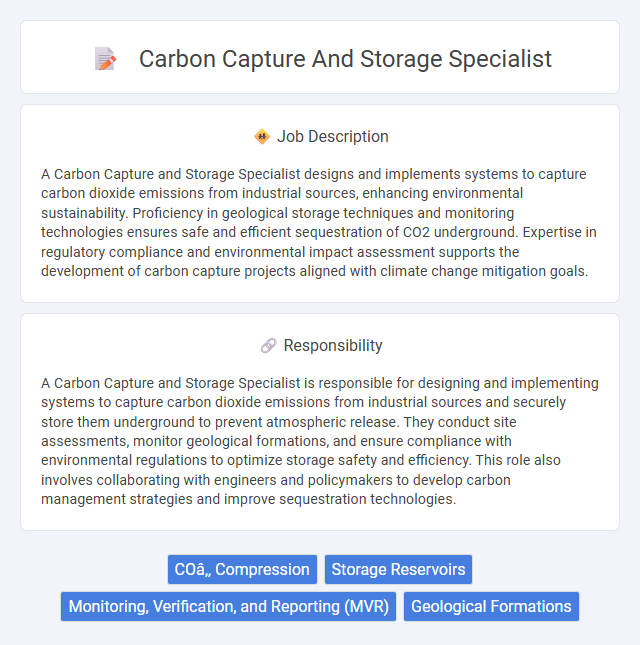
A Carbon Capture and Storage Specialist designs and implements systems to capture carbon dioxide emissions from industrial sources, enhancing environmental sustainability. Proficiency in geological storage techniques and monitoring technologies ensures safe and efficient sequestration of CO2 underground. Expertise in regulatory compliance and environmental impact assessment supports the development of carbon capture projects aligned with climate change mitigation goals.
Individuals with a strong background in environmental science or engineering are likely to be well-suited for a Carbon Capture and Storage Specialist role. Those who thrive in analytical, detail-oriented environments and have a commitment to sustainability may find this job fulfilling. Candidates who prefer dynamic, field-based work or lack interest in long-term project monitoring might face challenges adapting to this position.
Qualification
A Carbon Capture and Storage Specialist typically requires a degree in environmental science, chemical engineering, or geology, complemented by expertise in carbon capture technologies and subsurface storage methods. Proficiency in data analysis, environmental regulations, and risk assessment is essential for managing capture processes and ensuring safe CO2 sequestration. Certification or experience with monitoring, reporting, and verification (MRV) techniques enhances effectiveness in maintaining compliance and optimizing storage solutions.
Responsibility
A Carbon Capture and Storage Specialist is responsible for designing and implementing systems to capture carbon dioxide emissions from industrial sources and securely store them underground to prevent atmospheric release. They conduct site assessments, monitor geological formations, and ensure compliance with environmental regulations to optimize storage safety and efficiency. This role also involves collaborating with engineers and policymakers to develop carbon management strategies and improve sequestration technologies.
Benefit
Carbon Capture and Storage Specialists are likely to benefit from contributing directly to climate change mitigation by reducing greenhouse gas emissions. They probably enjoy opportunities for career growth in the expanding clean energy sector while working on innovative technologies. This role often offers a sense of purpose by supporting sustainable environmental solutions and regulatory compliance.
Challenge
A Carbon Capture and Storage Specialist likely faces the challenge of optimizing technology to efficiently capture carbon emissions while minimizing operational costs and environmental impact. Managing the complexities of long-term storage safety and regulatory compliance probably requires continuous innovation and monitoring. Balancing technical feasibility with economic and policy constraints may prove to be a significant obstacle in advancing CCS projects.
Career Advancement
Carbon Capture and Storage Specialists play a crucial role in reducing greenhouse gas emissions by developing and implementing technologies to capture and securely store carbon dioxide. Career advancement in this field often involves gaining expertise in advanced carbon capture methods, regulatory compliance, and project management, leading to senior technical or managerial positions. Professionals who acquire certifications, contribute to innovative research, and demonstrate successful project outcomes are highly sought after for leadership roles within environmental consulting firms, energy companies, and governmental agencies.
Key Terms
CO₂ Compression
A Carbon Capture and Storage Specialist focusing on CO2 compression designs and operates efficient compression systems to reduce the volume of captured CO2 for transport and storage. Mastery in high-pressure equipment, thermodynamics, and gas behavior is essential to optimize energy consumption and ensure safe, continuous operation. Expertise in regulations and monitoring techniques enables compliance with environmental standards and enhances the effectiveness of carbon sequestration projects.
Storage Reservoirs
Storage reservoirs play a critical role in carbon capture and storage (CCS) by securely containing injected CO2 to prevent atmospheric release. Specialists analyze geological formations such as deep saline aquifers, depleted oil and gas fields, and unmineable coal seams to evaluate their capacity, integrity, and long-term stability. Advanced modeling and monitoring techniques ensure effective pooling, leakage prevention, and compliance with environmental regulations.
Monitoring, Verification, and Reporting (MVR)
Carbon Capture and Storage (CCS) Specialists focusing on Monitoring, Verification, and Reporting (MVR) ensure accurate tracking of CO2 injection and storage sites to maintain regulatory compliance and environmental safety. They utilize advanced sensor technology, data analytics, and geospatial modeling to detect leaks and assess storage integrity over time. Expertise in generating detailed MVR reports is critical for validating carbon sequestration processes and supporting carbon credit frameworks.
Geological Formations
A Carbon Capture and Storage Specialist focuses on identifying and evaluating suitable geological formations such as depleted oil and gas reservoirs, deep saline aquifers, and unmineable coal seams for effective CO2 sequestration. Expertise in sedimentology, structural geology, and reservoir characterization ensures secure, long-term storage while preventing leakage and environmental impact. Advanced modeling and monitoring techniques are employed to assess formation integrity and optimize injection strategies for maximum storage capacity.
 kuljobs.com
kuljobs.com